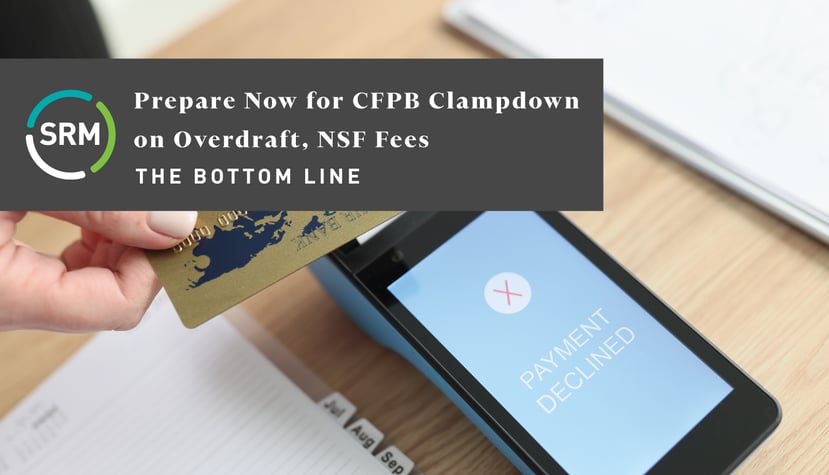
The CFPB has proposed a rule to limit overdraft charges at larger U.S. banks and credit unions – though financial institutions of all sizes should take note.
The proposal, which the CFPB estimates would directly apply to 175 depository institutions, would address an overdraft exemption in the Truth in Lending Act (TILA) and other consumer financial protection laws. It would replace the typical $35 overdraft fee with two options for establishing lower fees.
Banks and credit unions with more than $10 billion of assets could charge fees using an established benchmark — likely $3 to $14 per instance. They could also opt to charge fees that cover their own expenses if they reveal their cost data.
The CFPB wasn’t done – proposing another rule to bar financial institutions from charging nonsufficient funds (NSF) fees on transactions declined in real time. The rule would do away with fees tied to declined debit card purchases and ATM withdrawals, as well as some peer-to-peer payments.
The result of both proposals, if implemented, would be much lower fees across the industry.
It’s Been a Long Time Coming
The proposals shouldn’t surprise anyone. The bureau warned in mid-2022 that it would step up oversight of overdraft and NSF fees.
It then went after specific banks with enforcement actions and fines, including Wells Fargo ($205 million), Regions ($15 million) and Atlantic Union – even if they had ended overdraft policies in the bureau’s crosshairs. A few consumer-driven lawsuits have led to changes at other banks.
Several banks proactively dialed back fees, including Wintrust, Sandy Spring, and Pinnacle Financial.
As a result, service charges on deposit accounts have declined. Those fees fell by 10% in the first nine months of 2023 compared to a year earlier, based on call report data compiled by the Federal Deposit Insurance Corp.
Regarding the NSF fee proposal, the CFPB noted that financial institutions rarely charge fees for transactions declined in real time. The proposal is largely intended to “proactively set regulations” as instant payments gain momentum, the bureau said.
Pressure for Everyone
While the proposed overdraft changes, if approved, won’t kick in until late 2025, all banks and credit unions should get ready for major pressure on noninterest income. Smaller banks would be exempt in theory, but history proves that regulatory pressure on large financial institutions always trickles down to impact the entire industry.
“The proposal will still trickle down to us,” John Buhrmaster, president and CEO of 1st National Bank of Scotia and a former chairman of the American Bankers Association, observed in a LinkedIn post.
Smaller banks have historically relied more on overdraft fees than bigger financial institutions. Woodforest (22% of 2023 revenue through Sept. 30), Gate City Bank (16% of revenue), and International Bank of Commerce Oklahoma (11% of revenue) are notable examples, based on data compiled by S&P Global Market Intelligence. Gate City Bank agreed last summer to pay $5.5 million to settle legal claims that it breached its contract with depositors tied to overdraft and NSF fees.
The Bottom Line
Changes to fee structures are inevitable – fortunately banks and credit unions have more than a year to assess their circumstances, calibrate the market, and implement any necessary changes.
Consumers are going to prefer dealing with financial institutions with lower fees and clear disclosures, so even smaller banks will need to lower fees to play defense.
Evaluate your options, communicate with customers, and update your fee structure to one that works for all parties. Identify other ways to bring in revenue and/or trim costs, keeping in mind that the CFPB is monitoring all consumer-oriented fees. SRM’s experts can assist in the review process of these types of operational choices and can help you reach a path of consistency, even in the face of change.


